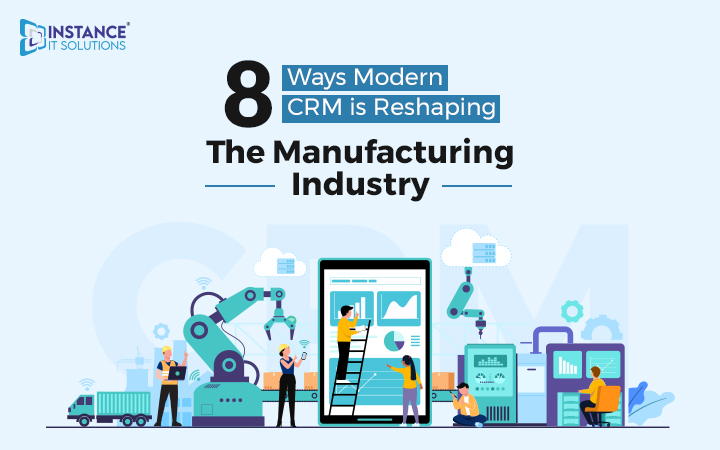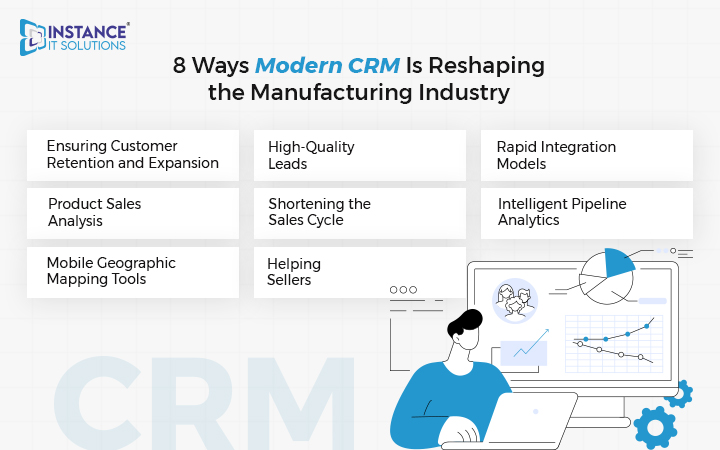Modern CRM Software: Software to Revolutionize the Manufacturing Industry 2024
-

-
Shivendra Saxena
30 Sep, Sat
Content

Introduction
The new wave of technological advancement is being fully embraced by the current market. Traditional business models are being disrupted, and new growth opportunities are being created by implementing new channels and technologies, such as the consumerization of B2B, the elimination of unnecessary tiers of distribution, the Internet of Things (IoT), Analytics, and AI. Customer Relationship Management (CRM) is another one of them.Â
It is no longer necessary for a team to manually handle any client data, including personal information, sales history, preferences, and choices. Businesses in this rapidly growing market cannot continue to rely on manually handled tasks, which are unable to deliver accurate consumer information and make it challenging to have it available at the appropriate moment.Â
CRM solutions are the ultimate solution. They help you in many ways, such as keeping track of each lead that enters your sales pipeline, collecting and analyzing client data to discover crucial information about their behaviour, customizing audience experiences, and much more.Â
We are here to talk about how CRM is revolutionizing the manufacturing sector, but before that, let's dive into some basics that you ought to know.
What Is CRM?
The importance of the customer relationship in sustaining business operations and enhancing the customer experience is now recognized by almost every corporation.Â
Customer Relationship Management software aids in the management of all client data and information. In today's technologically evolved environment, organizations should not manage consumer data using conventional methods.Â
CRM systems assist in managing customer interactions and data tracking. They help you easily track all communications and nurture relationships with leads and clients. Moreover, they also connect all the data from your sales leads and customers in one place.Â
A good CRM goes beyond simply gathering data. It enables you to use all the information to:Â
- Send leads and clients the appropriate communications at the appropriate times.Â
- Target the most promising clients with your sales teams.Â
- Cut the sales cycle in half.Â
- Follow-up, analysis, and result improvement.Â
CRM software boosts your sales and marketing without requiring you to hire large teams or spend a fortune on advertising. One can build a sales and marketing engine that accelerates business growth. That is all on CRM; here, we move towards how it aids manufacturers.
Customer Relationship Management For the Manufacturing Industry
The manufacturing sector, which accounts for 25% of all economic activity worldwide, is defined by a constant need for innovation and productivity growth. It makes sense to set up a manufacturing-specific CRM to accomplish these objectives. Â
Here are five explanations why a manufacturing CRM with traditional production capabilities can enhance value by fostering a more adaptable business that can foresee customer demand.Â
Accurate Demand ForecastingÂ
This functionality is quite helpful for businesses operating in sectors that change quickly, such as high-tech, electronics, retail, etc.Â
Manufacturers can shorten the time it takes to produce a product from concept to market entry by using a manufacturing CRM system. As a result, you do not need to spend money on another industrial planning program. CRM will serve as a single platform, enabling you to estimate demand accurately and provide better information about manufacturing. Companies can acquire a competitive advantage by bringing products to the market before rivals do so by reacting more quickly and acting strategically.Â
Improved Product QualityÂ
A manufacturing company must keep producing high-quality items regularly and effectively to stay in business. Poor or defective items will not only damage the reputation of the brand but will also result in unhappy customers, which will lower sales and revenue. With CRM for manufacturing, a company may gather and examine data from many sources and identify process flaws that lead to product failures in real-time.Â
Smart Supply ChainÂ
Business operations that are not streamlined and simplified may become highly intricate. Additionally, costly implementations of production management software may not yield the intended ROI for the business. Implementing CRM in the manufacturing industry can give producers comprehensive and practical data on operations, inventory management, order processing, warehousing, and distribution networks.Â
It enables businesses to control production schedules. Secondly, having a smart supply chain can produce excellent outcomes. It allows you to keep up a steady supply of items and get them from the production site to the market rapidly.Â
Enriching Customer RelationshipsÂ
In the manufacturing sector, managing customer connections may be revolutionary. A manufacturing company values safe product delivery and after-sale services just as much as making new business deals.
A manufacturing CRM system will assist in managing daily queries and service calls and keeping track of any warranty, repair, or service concerns.Â
More BusinessÂ
In contrast to other manufacturing software options, CRM software also functions as an effective marketing tool and aids in growing your fan base and clientele.Â
It enables the Marketing and Sales divisions to compile thorough reports while considering customer behaviour. Manufacturing CRM solutions allows customer care representatives to support consumers right away while also providing valuable data that aids in the long-term improvement of product quality and business procedures. Operations are streamlined, costs are decreased, and earnings are raised.
How Is Modern CRM Reshaping The Manufacturing Industry?
Strong relationships are the foundation of a successful business, whether they are with partners or customers like distributors. By selecting a CRM for manufacturing, you'll be able to safeguard and develop these vital client relationships. Additionally, you'll gain from better time management, which will free you to concentrate on expanding your firm. You may automate repeat orders, make reminders to schedule courtesy calls, and follow up on new leads. Furthermore, you can also send automatic newsletters and track emails. 
Ensuring Customer Retention and ExpansionÂ
Manufacturers have established enterprises that rely heavily on repeat business from existing clients. Manufacturing businesses that are using CRM must have a balanced strategy to implement both existing account management and tools and procedures for acquiring new customers. The best chance to increase revenue may be to implement features that guarantee current consumers are retained and increased.Â
CRM platforms have the ability to shorten sales cycles and simplify the sales process in addition to managing current client relationships. Sellers will have the tools to complete new customer sales cycles quickly and accurately by implementing optimal sales playbooks, automated workflows, quotation and proposal automation, and similar tools.Â
High-Quality LeadsÂ
More customers and higher income are the results of improved sales operations. High-quality prospects might benefit from enhanced sales procedures.Â
You can achieve it thanks to lead management in CRM for manufacturing software. The distributors and merchants who are most likely to become partners with your sales team should be given priority. While you target leads with marketing efforts, CRM can keep track of prospect reactions and interactions. Based on their propensity to convert, the system employs methods like lead scoring to decide which contacts are worth pursuing.Â
Rapid Integration ModelsÂ
Manufacturers frequently have several technologies, such as ERP, that give customer-facing employees valuable data. CRM should be integrated with these systems.
You should anticipate that your CRM will provide integration to email and calendar services like Outlook and Gmail as a regular feature. Some suppliers take things a step further and integrate on the server side, enabling always-on and nearly real-time integration without relying on the user's desktop or mobile client.Â
The most popular link, aside from email and calendar, involves ERP or accounting systems, allowing the CRM system to contain orders and invoicing history for clients. This data must be available to all teams who interact with customers.Â
Sellers must comprehend purchasing trends in order to respond to retention or growth opportunities, marketers must have the information to build campaigns based on past purchases, and services must be aware of the goods or services that have been purchased. Manufacturers may add value to their users, reduce project risk, and speed up the adoption of the new system by selecting a CRM vendor that offers these features.Â
Product Sales AnalysisÂ
Don't miss out on any opportunities. Sales managers should be familiar with their customers' habits and preferences, but occasionally, salespeople may use some assistance. Product sales analysis allows producers to spot trends and possibilities that might otherwise go unnoticed by looking at product and sales data at the item level.Â
Manufacturers can more rapidly analyze the performance of their products and consumer preferences by incorporating item-level sales analysis capabilities into their CRM systems. With the use of this information, sellers may target marketing efforts more successfully and immediately uncover cross-sell and upsell opportunities.Â
Shortening the Sales CycleÂ
Long and complicated sales cycles are a common problem for manufacturers. Deals require numerous decision-makers, in-depth technical analyses, protracted negotiations, and numerous proposal modifications over a long period, which raises costs and presents opportunity risk. CRM systems' built-in contract management solutions help speed up the sales process by automating contract preparation, negotiation, and approval. Manufacturers may raise their sales velocity and boost their bottom line by lowering the time and effort needed to close deals.Â
Intelligent Pipeline AnalyticsÂ
To manage the sales force, it's critical to comprehend the characteristics of the sales pipeline. Sales leaders may generate accurate projections and understand what is working and what is not by using the robust pipeline and revenue analytics tools provided by CRM systems. Sellers receive actionable insight into sales funnels through lead and opportunity AI-based predictions. These revenue and pipeline analytics features are of utmost importance to manufacturers and ought to be built into the CRM.Â
Mobile Geographic Mapping ToolsÂ
Manufacturers can better understand their sales regions and spot any locations that might be underserved by integrating geographic mapping tools into their CRM systems.Â
Users who can view their regions with the aid of geographic mapping technologies can better plan their journeys and manage their time. Manufacturers can find any account coverage gaps and decide where to realign their territories or allocate their resources by examining data on client locations, sales activity, and opportunity development.Â
Helping Sellers When Navigating Complex Customer OrganizationsÂ
By giving sales teams access to organization charts, contact information, and relationship analytics, customer relationship management systems can aid them in navigating complex customer organizations. Sales teams may more effectively target their efforts and cultivate connections with the right people in the right locations by visualizing the hierarchy of their client organizations, filtering for buying centers vs delivery locations, and keeping track of their interactions with key decision-makers.Â
Conclusion
To conclude, manufacturers can use a CRM to improve client connections and generate precise sales projections to help them better organize and run their stores.Â
Manufacturing is becoming more and more client-focused; thus, it's critical for businesses to handle customer connections effectively and efficiently.Â
We are trusted by over 650+ clients.
Join them by using our services and grow your business.
Request a callbackRequest a callback


 Contact Us
Contact Us
